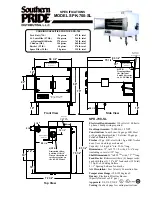
00031461.DOC, Version 1.1
51/56
9.2 Receiver module RM-105
■
To switch on the receiver module, advance the On/Off/Volume control from the position “OFF“. The LED
A/B lights red or green depending on the receiving antenna A or B currently active.
■
Prior to switching on the transmitter (
HM-105, ALT-105
or
TM-105
), first set the receiving unit to a
free transmission channel:
■
Press the SET button. The channel indication on the display starts flashing.
■
The channel indication keeps flashing for approx. 10 seconds. Meanwhile, the channel can be selected
with buttons
▲
and
▼
.
■
Confirm the channel selection with the SET button (within 10 seconds) otherwise the unit returns to the
channel previously adjusted.
If the LED RF lights up after channel selection when the transmitter is switched off, interfering signals of
other transmitters are received on this channel. In this case, adjust the receiving unit to a different
channel.
■
To indicate the frequency instead of the channel on the display keep one of the buttons
▲
or
▼
pressed.
(Please refer to chapter
11.1 Channel configuration
for a table listing which channel is assigned to which
frequency).
■
If the transmitter is switched on and set to the same channel as the receiver unit, the LED RF lights up to
indicate reception of a radio signal. The LED AF lights up if the transmitter transmits an audio signal of
sufficient level on the radio frequency adjusted.
■
Adjust the desired volume for the audio signal received with the Volume control.
9.3 Transmitter module ALT-105
If several active speaker systems are required of PA application, a wireless audio link mode is possible via
the optional transmitter module
ALT-105
. Via the transmitting unit of an
W.A.M.S.-05
active speaker
system, the mixed signal can be transmitted to the receiver units of further
W.A.M.S.-05
active speaker
systems
-
unaffected by the Master control and by the Tone controls.
■
To switch on the transmitter module, advance the On/Off/Volume control from the position “OFF“. The LED
TX lights up to indicate transmission of a radio signal.
■
For the audio link mode, adjust the transmitting unit of the primary system and the receiver units of the
secondary systems to the same transmission channel:
■
Press the SET button. The channel indication on the display starts flashing.
■
The channel indication keeps flashing for approx. 10 seconds. Meanwhile, the channel can be selected
with buttons
▲
and
▼
.
■
Confirm the channel selection with the SET button (within 10 seconds) otherwise the unit returns to the
channel previously adjusted.
When selecting the channel, make sure that the transmitting unit and the receiver units of the primary
system are set to different channels. Otherwise, there will be feedback.
■
To indicate the frequency instead of the channel on the display keep one of the buttons
▲
or
▼
pressed.
(Please refer to chapter
11.1 Channel configuration
a table listing which channel is assigned to which
frequency).
■
The LEDs AF LEVEL indicate the level of the audio signal fed to the transmitter unit.
The yellow LED lights up when the input signal of the transmitting unit has reached a certain minimum level.
The red LED lights up when the input signal of the transmitting unit has reached the maximum level where it
is close to overload. The LED should not light up or light up only shortly with signal peaks. If it lights up
permanently, the signal is overloaded. In this case, reduce the volume of the corresponding signal source
accordingly
■
Adjust the desired volume for the audio signal transmitted with the Volume control.
9.4 Echo module EM-105
The optional echo module
EM-105
is equipped with two microphone channels that can be provided with
an echo effect created via the integrated effects processor.
■
Connect your microphone(s) via a 6.3 mm plug to the balanced inputs MIC IN.
■
To switch on the echo module, advance the On/Off/Volume control from the position “OFF“.
■
Adjust the desired volume for both microphone channels with the corresponding Volume control.






































